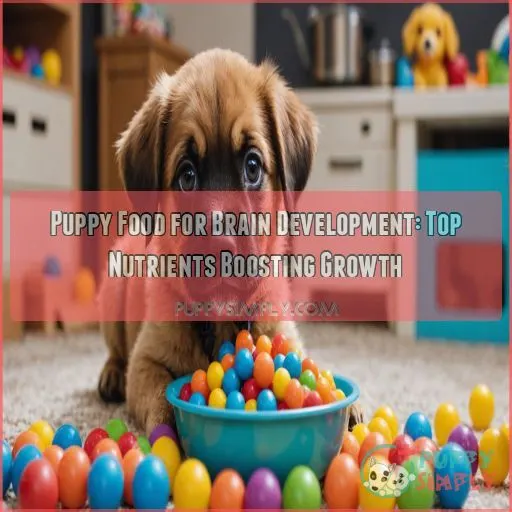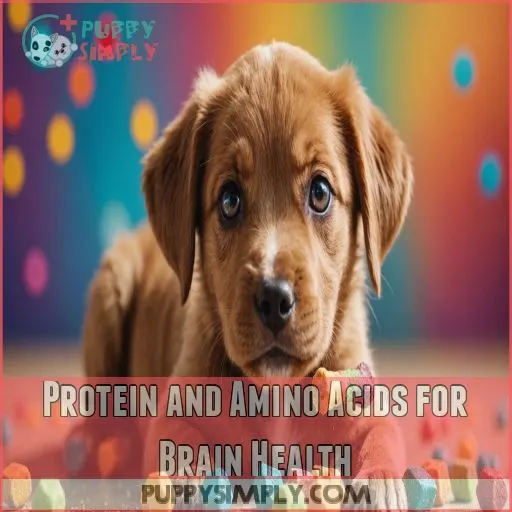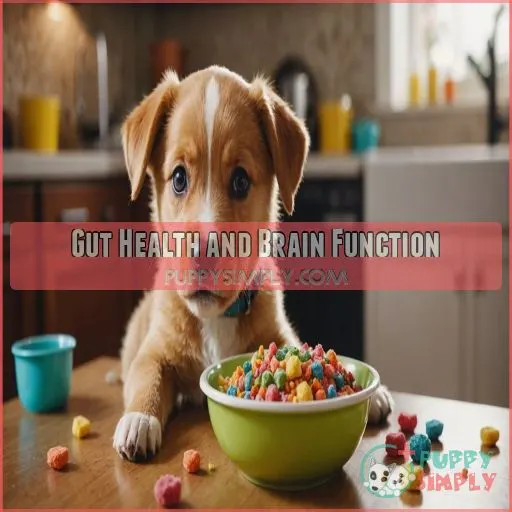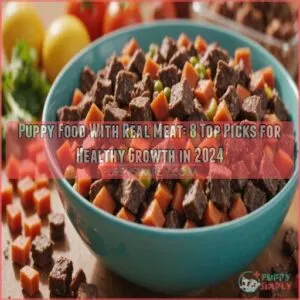This site is supported by our readers. We may earn a commission, at no cost to you, if you purchase through links.

Choosing food rich in DHA, choline, and antioxidants is like turning the key in your pup’s brain engine.
DHA, found in fish oils and algae, is essential for building a smart and sharp doggo.
Don’t forget choline, the unsung hero for memory and learning, and antioxidants – they’re like the bouncers protecting brain cells from harm.
Focusing on these nutrients in your pup’s diet is a recipe for setting the stage for a healthy adult dog.
Ready to learn more about puppy nutrition? Keep reading!
Table Of Contents
- Key Takeaways
- Key Nutrients for Brain Development
- Brain Development Stages
- Choosing the Right Puppy Food
- Protein and Amino Acids for Brain Health
- Complex Carbohydrates for Brain Energy
- Gut Health and Brain Function
- Brain-Boosting Foods for Puppies
- Avoiding Deficits in Brain Development
- Nutritional Needs by Life Stage
- Frequently Asked Questions (FAQs)
- Conclusion
Key Takeaways
- You’re not just filling your pup’s belly – you’re fueling their growing brain! Focus on puppy foods rich in DHA, choline, and antioxidants to set the stage for a smart, sharp doggo. Think of it as turning the key in your pup’s brain engine.
- Don’t underestimate the power of a happy tummy for a brainy pup. The gut-brain axis is like a superhighway of communication, so feeding your furry friend probiotics and prebiotics can actually boost their mood, learning, and memory. It’s like giving your puppy’s brain a spa day!
- As your pup grows, their nutritional needs change faster than they outgrow their collar. Keep an eye on their life stage and adjust their diet accordingly – from DHA-rich puppy food to antioxidant-packed meals for seniors. It’s like tailoring a suit to fit just right at every age.
- Exercise isn’t just for burning off that puppy energy – it’s a mental gym session too! Regular physical activity increases blood flow to your pup’s noggin, promoting neuron growth and cognitive function. So when you’re playing fetch, you’re not just tiring them out, you’re helping build a brighter canine Einstein!
Key Nutrients for Brain Development
When you’re feeding your puppy, it’s not just about filling their belly—you’re also feeding that growing brain.
By including essential nutrients like DHA, choline, and antioxidants, you’re setting the stage for a smart and vibrant future, because who doesn’t want a pup that finds the hidden tennis ball every time?
The Importance of DHA and Omega 3
For your puppy’s brain development, don’t skimp on DHA and omega-3s. It’s super important.
Picture it:
- DHA sources: fish oil, algae
- Omega-3 benefits: cognitive health
- Puppy vision
- Brain development
- Dog food brands
The Role of Choline in Neurocognitive Function
Choline might not be as famous as omega-3s, but boy does it pack a punch for your pup’s brain development!
This key nutrient supports memory and learning, preventing choline deficiency.
Choose puppy food with rich choline sources for neurocognitive function.
The Impact of Antioxidants on Brain Health
Antioxidants are brain superheroes, shielding your pup’s mind from free radical wildfires.
Think blueberries, carrots, and spinach – these antioxidant-rich foods can help maintain cognitive function and combat age-related brain decline.
- Antioxidants neutralize damaging free radicals.
- Antioxidants protect brain cells from oxidative stress.
- Antioxidants support healthy brain function and development.
- Antioxidant-rich foods like berries, veggies, and teas can boost brain health.
Ensuring Adequate Nutrient Intake in Puppies
You might think feeding your puppy is just filling a bowl, but brain development needs more than kibble!
Choose puppy formulas with DHA, choline, and antioxidants from puppy food brands.
If choosing a homemade puppy diet, be vigilant about nutrient deficiencies.
Brain Development Stages
In the early stages of your puppy’s life, understanding brain development is essential for setting them up for success.
Think of it as finding the right tunes to fine-tune a complex symphony; you’re fueling their growth with music they can’t resist, and it all starts before they’re even born!
Prenatal and Postnatal Growth
Puppy’s brain development begins before they’re even born.
Prenatal nutrition, especially DHA and Choline, plays a starring role in shaping their tiny noggins.
Postnatal puppy growth? It’s like adding rocket fuel!
Making sure mom’s dog food ingredients are rich in brain-boosting nutrients is key to preventing future cognitive dysfunction.
The First 12 Weeks of Life
Your puppy’s brain grows rapidly in the first 12 weeks, reaching 90% of adult size by week 12.
Make sure your pup gets the right nutrients like DHA and choline to support this critical development period.
Stay on top of vet checkups, too – your puppy’s brain health is in your hands!
Factors Influencing Brain Development
Like a budding scientist in a lab, genetics sets the blueprint for brain development.
Yet, life isn’t just black and white; stress, sleep, and environment paint the colorful strokes.
Early learning, rich puppy food, and engaging mental stimulation are secret recipes baking brains, while dog brain exercises combat pesky brain aging.
Choosing the Right Puppy Food
Choosing the right puppy food is really important for your little one’s brain development, and yes, even the pickiest pups deserve the best brain food.
With so many options out there, finding a commercial puppy food rich in DHA can feel like finding the perfect pair of shoes for your dog, minus the chew toy temptation.
Commercial Puppy Foods Rich in DHA
Looking for DHA-rich brands to boost your puppy’s brain development? Choosing the best puppy food can feel like figuring out a maze.
Puppy food reviews often highlight products with high DHA levels to support growth.
While DHA supplements can help, finding a food that’s naturally packed with it makes for a balanced diet.
Evaluating the Nutritional Content of Puppy Food
Evaluating puppy food labels is key.
Look for high-quality ingredients, like DHA-rich fish oil, to support brain growth.
Avoid fillers and artificial additives.
Check the nutrient analysis – it should align with your pup’s needs.
Quality packaging seals in freshness.
With the right food, you’ll see a brighter, more alert puppy.
Considerations for Large and Small Breeds
Choosing puppy food can feel like a rollercoaster!
Large breeds grow rapidly and need food that supports joint health,
while small breeds have faster metabolisms, requiring calorie-dense meals.
Choose appropriate puppy food sizes and calorie requirements to match breed-specific needs,
ensuring safe and healthy brain development for your furry companion.
Protein and Amino Acids for Brain Health
For a puppy’s brain to thrive, high-quality protein sources and essential amino acids are the real MVPs.
They support neurotransmitter production, helping maintain a balanced mood and cognitive health in your furry Einstein.
The Importance of High-Quality Protein Sources
When selecting puppy food, consider the power of high-quality protein sources for brain health.
They’re not just about muscle building and energy; they’re important for immunity and behavior, too!
Imagine protein as your puppy’s superhero.
Make sure you include:
- Lean meats like chicken or turkey
- Eggs
- Fish
- Low-fat dairy
Amino Acids and Neurotransmitter Production
Amino acids like tryptophan and tyrosine are the building blocks for neurotransmitters, which regulate your pup’s mood, learning, and memory.
High-quality protein sources are essential for a balanced brain chemistry and promote overall cognitive health.
Make sure their diet is rich in these sources to support a balanced brain chemistry and promote overall cognitive health.
Your furry friend will thank you!
Maintaining a Balanced Mood Through Diet
After understanding neurotransmitter production, let’s chew over mood.
Stress-reducing foods are a real doggy-pleaser!
Mood-boosting treats, like turkey rich in tryptophan, offer amino acid balance and promote relaxation.
Recognizing the gut-brain connection also helps mitigate dietary anxiety.
So, why not indulge your pup with something tasty yet beneficial?
Complex Carbohydrates for Brain Energy
You might think your puppy’s energy comes from endless play, but it’s actually those complex carbohydrates in their diet fueling all that zooming around.
complex carbohydrates gives your pup sustained energy and even keeps their gut happy—so no more "oopsie" surprises on the carpet!
The Role of Carbohydrates in Energy Production
You might think carbs are just fillers, but they’re brain fuel for your pup! Complex carbohydrates provide sustained energy release.
Look for dog food formulas with:
- Low glycemic index foods
- Whole grains
- Sweet potatoes
- Lentils
- Barley
They’ll keep your puppy’s brain buzzing and tail wagging!
Complex Carbohydrates for a Healthy Gut
Complex carbohydrates like sweet potatoes and whole grains are great for your pup’s gut.
These fiber-rich foods nourish the beneficial bacteria in their tummy, which in turn support healthy brain function.
Prebiotics and probiotics are also gut-friendly additions to your dog’s diet.
Benefits of a Balanced Carbohydrate Intake
Balancing carbohydrates in your puppy’s diet can stabilize blood sugar like a tightrope walker balancing with a pole.
It promotes steady energy levels, mood regulation, and gut health.
You’ll see Fido wagging his tail in high spirits, tackling every play session with gusto, maintaining healthy weight management effortlessly.
Gut Health and Brain Function
Did you know that keeping your puppy’s tummy happy can actually boost their brain power too?
Thanks to the gut-brain axis, a healthy gut filled with good bacteria, achieved through probiotics, helps improve mood, learning, and memory, just like a magic wand for mental growth!
The Gut-Brain Axis and Vagus Nerve
Ever wondered how a puppy’s gut influences its brain? The underrated vagus nerve does just that. Here’s why it matters:
- It connects gut bacteria to brain behavior, promoting healthy development.
- Stress? No problem! Gut health tamps it down.
- Balanced microbiomes can ease anxiety.
Exploring helps puppies thrive!
Probiotics and Prebiotics for a Healthy Gut
Probiotics and prebiotics are your gut’s dynamic duo, keeping things running smoothly.
These friendly bacteria and fiber-rich foods nourish your pup’s microbiome, promoting a healthy gut-brain connection.
Incorporate yogurt, kefir, and high-fiber veggies to support your canine’s overall well-being.
A balanced gut means a balanced mind!
| Probiotic | Prebiotic |
|---|---|
| Yogurt | Bananas |
| Kefir | Oats |
| Sauerkraut | Chicory root |
| Kimchi | Garlic |
The Impact of Gut Health on Brain Development
Understanding the gut-brain axis, a communication superhighway, can vastly impact your puppy’s brain development.
A healthy gut microbiome, fueled by probiotics, sets the stage for reducing stress, anxiety, and depression.
It’s like giving your puppy a spa day for their brain—a calm, balanced, happy mind ready to learn.
Brain-Boosting Foods for Puppies
As you nurture your inquisitive pup, remember their budding brains crave a feast of brain-boosting foods rich in antioxidants and omega-3s.
Adding a splash of color to their meal with mushed fruit and veggies tickles their taste buds but also supports cognitive growth.
Antioxidant-Rich Foods for Puppies
Your puppy’s brain thrives on antioxidant-rich foods—think of them as tiny superheroes fighting off brain-damaging villains.
Add these to your pup’s menu:
- Blueberries: These superfoods for pups offer a burst of vitamins.
- Carrots: Perfect for crunchy snacks.
- Spinach: Whip up homemade antioxidant recipes for a nutrient-packed treat!
Omega-3 Fatty Acids and Brain Function
Omega-3s like DHA are essential for your pup’s brain development.
Found in fish oil, these fatty acids support cognitive function and protect against deficits.
A table of top omega-3 sources can help you choose the best brain-boosting supplements for your growing companion.
| Omega-3 Source | DHA Content |
|---|---|
| Salmon | High |
| Flaxseed | Moderate |
| Walnuts | Low |
Adding Mushed Fruits and Vegetables to Puppy Food
While omega-3 fatty acids work wonders for brain function, adding mushed fruits and vegetables offers puppies a delightful boost.
Picture them wagging tails over blueberries or carrots! Just stick to a safe fruit list, and balance your portions.
Homemade recipes make puppy food safety a breeze, introducing them gradually.
Avoiding Deficits in Brain Development
Ensuring your puppy’s brain develops properly is like making sure their favorite toy stays in top shape—it’s super important and requires the right care.
Cognitive deficits, such as forgetfulness or clumsiness, can be a sign of a problem.
Adjusting their diet with essential nutrients like DHA and choline can make all the difference.
Inadequate Intake of DHA and Choline
Think of it this way: a puppy missing important nutrients is like a car running on fumes. Without enough DHA and choline, your puppy might face developmental hurdles like cognitive deficits or even visual issues.
Here’s a quick guide to support brain development:
- DHA Supplements
- Fish-rich meals
- Nutrient-dense puppy foods
- Regular vet check-ups
Recognizing the Signs of Cognitive Deficits
Spotting signs of cognitive deficits in puppies is key.
Look for changes in behavior, learning difficulties, delayed milestones, or abnormal responses to stimuli.
Trouble with social interactions could also indicate an issue.
Don’t worry – with the right diet, you can help get your pup’s brain back on track.
Mitigating Deficits Through Diet and Nutrition
If you notice your puppy’s gazelle-like energy fading into sluggishness, tweaking their diet could be the game-changer.
Boost DHA levels and combat choline deficiency with:
- Leafy greens, rich in nutrients
- Fish oils for omega-3 power
- Eggs with choline punch
- Antioxidant-packed berries
- Digestive-friendly fibers
Nutritional Needs by Life Stage
Feeding your puppy isn’t just about filling their bowl; it’s about fueling their brain as they grow.
Just like switching up your morning coffee, you’ll need to adjust their diet as they age to make sure those neurons stay fired up and healthy.
The Changing Nutritional Needs of Puppies
Just like human kids, puppies have changing dietary needs as they grow. During weaning stages, make sure their puppy food changeover meets nutrient ratios suitable for their growth stages. Watch for food sensitivities in these little furballs. After all, you wouldn’t want a grouchy puppy with an upset tummy!
Growth Stages and Dietary Needs are important for puppies, especially during the puppy growth stages.
| Growth Stage | Nutrients Needed | Considerations |
|---|---|---|
| Newborn | Colostrum & DHA | Entirely on mother’s milk |
| Weaning | Protein & Fats | Gradual introduction to kibble |
| Juvenile | Balanced Diet | Monitor for allergies |
| Adolescent | Increased Calories | Support rapid growth |
Feeding Practices for Different Life Stages
Feeding your puppy a balanced diet is really important for each life stage.
Provide high-quality protein for growth, complex carbs for energy, and antioxidants for brain health.
Adjust portions as they mature – puppies need more calories, while seniors benefit from lower-calorie, nutrient-dense meals.
Consult your vet for personalized feeding recommendations.
The Importance of Adjusting the Diet With Age
Adjusting the diet with age is like tailoring a suit—it needs to fit just right.
Puppies need DHA-rich food, while adults crave balanced nutrients.
A senior dog diet should focus on antioxidants and joint support.
Here’s a handy table to guide your puppy food choices:
| Life Stage | Key Nutrient Needs | Example Foods |
|---|---|---|
| Puppy | DHA, Protein | Fish, Eggs |
| Adult | Balanced Diet | Chicken, Rice |
| Senior | Antioxidants, Fiber | Spinach, Sweet Potato |
Frequently Asked Questions (FAQs)
How can I monitor my puppys brain development progress?
Ever wonder if your pup’s brain is growing as fast as their paws?
You’ll notice progress through improved problem-solving, memory, and focus.
Watch for quicker responses to commands and increased curiosity.
Regular vet check-ups can also track development milestones.
What are the signs of cognitive issues in puppies?
You’ll want to watch for signs like unusual inattentiveness, lack of responsiveness to commands, or difficulty learning new tasks.
Cognitive issues could also be indicated by excessive sleep, disorientation, or changes in appetite.
Don’t hesitate to consult your vet!
Can supplements help boost brain development in puppies?
Imagine your puppy’s brain developing like a flower.
While a balanced diet is important, supplements can indeed boost brain development.
DHA, choline, and antioxidants are key players.
Always consult your vet before adding any new supplement to your pup’s regimen.
How does exercise impact a puppys brain health?
Exercise boosts your puppy’s brain health by increasing blood flow and oxygen to the noggin.
It’s like a mental gym session, promoting neuron growth and cognitive function.
Plus, it’s a great way to bond and have fun together!
What are the long-term effects of poor nutrition on a puppys brain?
Poor nutrition can stunt your puppy’s cognitive growth, leading to learning difficulties and behavioral issues.
It’s like building a house with subpar materials – the foundation won’t be solid, affecting everything from memory to problem-solving skills long-term.
Conclusion
Feeding your puppy’s brain is like fueling a rocket to the stars of canine intelligence!
By focusing on puppy food for brain development, you’re setting your furry friend up for a lifetime of tail-wagging success.
As you explore puppy nutrition, keep these brain-boosting nutrients in mind.
Your pup’s developing mind will thank you, and before you know it, you’ll have a four-legged Einstein on your hands!















